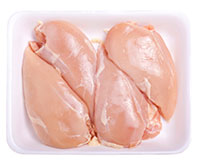2013 Salmonella Outbreak Linked to Chicken – Advice to Consumers and Retailers
Multistate Outbreak of Salmonella Heidelberg Infections Linked to Chicken (Final Update)
Posted July 10, 2013 05:00 PM ET
This outbreak appears to be over. However, Salmonella is an important cause of human illness in the United States. More information about Salmonella, and steps people can take to reduce their risk of infection, can be found on the CDC Salmonella Web Page.

Pack of chicken breasts
It is not unusual for raw poultry from any producer to have Salmonella. It is important for consumers to follow food safety tips to help protect themselves and others from foodborne illness.
CDC and USDA-FSIS recommend consumers follow these food safety tips to prevent Salmonella infection from raw poultry:
- Clean
- Wash hands with warm soapy water for 20 seconds before and after handling raw meat, poultry or seafood.
- Wash utensils, cutting boards, dishes, and countertops with hot soapy water after preparing each food item and before you go on to prepare the next item.
- Food contact surfaces may be sanitized with a freshly made solution of 1 tablespoon of unscented, liquid chlorine bleach in 1 gallon of water.
- Separate
- Separate raw meat, poultry, and seafood from other foods in your grocery shopping cart and in your refrigerator.
- If possible, use one cutting board for fresh produce and a separate one for raw meat, poultry, and seafood.
- Never place cooked food on a plate that previously held raw meat, poultry, or seafood.
- Cook
- Cook poultry to a safe minimum internal temperature of 165°F as measured with a food thermometer.
- Chill
- Chill food promptly and properly. Refrigerate or freeze perishables, prepared foods, and leftovers within 2 hours (or 1 hour if temperatures are above 90°F).
Contact your health care provider if you think you may have become ill from eating contaminated food.
- Symptoms include:
- Diarrhea, fever, and abdominal cramps 12 to 72 hours after infection.
- The illness usually lasts 4 to 7 days, and most persons recover without treatment.
- See Signs & Symptoms for more information.
- Children younger than 5 years, older adults, and people with weakened immune systems are more likely to have a severe illness from Salmonella infection.